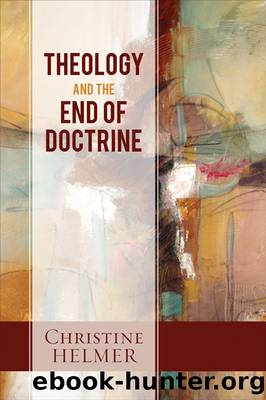Theology and the End of Doctrine by Christine Helmer

Author:Christine Helmer
Language: eng
Format: epub
ISBN: 9781611645255
Publisher: Westminster John Knox Press
I.2.3. Christian Beliefs and God
Until now there has been no reference to a âtranscendent realityâ that might bestow divine truth on human words. But when Marshall looks to ground the coherence of human assertions about Christian faith, he calls on God, making an argument that relates coherence to the divine simplicity. Marshall acknowledges that he is appealing to a âtechnical device ⦠of the way a simple or incomposite reality may be known,â which Thomas âderived from Aristotle.â With Aquinas as his interlocutor, Marshall claims that the divine simplicity is the way in which God holds things together as one. Godâs âown self-knowledgeâ is true, furthermore, because God is the âfirst truth.â By contrast, according to Marshall, human minds can know composite reality through sense perception, but in ââsimple thingsâ⦠there are no real distinctions which correspond to the distinctions between the relevant true sentences.â112 The simplicity argument undergirds the coherence among beliefs. There is a problem in identifying the kind of simplicity that Marshall might have in mind, however. He does not make the relevant distinctions between the simplicity of Godâs mental act by which God knows all things, for example, or the simplicity of objects of Godâs thought, or even if the objects of Godâs thought are connected by relations of entailment.
Further down the line, Marshall must find a way of relating Godâs self-knowledge to human beliefs that can be deemed perceptions of divine truth. These linguistically articulated statements, as they exist in the human mind and are âconformed to ⦠reality,â admit no distinctions between them when they are conformed to a reality that is simple. That reality is God, and the simplicity of this reality is preserved when God reveals Godâs own knowing to humans. Even though these assertions are âmanifoldâ in the human intellect, because they are conformed to the reality of Godâs knowing, which is simple, they yield âperception of divine truth.â113 Marshallâs argument goes as follows: âFaith, in other words, clings to the incarnate and triune God who manifests himself to us as first truth by way of the scripturally normed discourse of the Christian community. Indeed the teaching and preaching of the Church are not simply this communityâs talk about God, nor even Godâs talk about himself, but Godâs way of giving the world a share in his own self-knowledge.â114 Although this statement regarding revelation in incarnation does not quite cohere with the earlier claim about Godâs simplicityâbecause incarnation disrupts the divine simplicityâit identifies revelation as the source of belief and its truth as coherence among the articles of faith. In addition to the simplicity argument, revelation too emerges as another explanation for coherence among beliefs. When God reveals some of what God knows about Godâs self to us, then the divine act of revealing this body of beliefs together is what constitutes their coherence. Under the human conditions of faith, the revealed âpackage dealâ is truly and normatively formulated. The different assertions are asserted to cohere by virtue of Godâs revelation.
Download
This site does not store any files on its server. We only index and link to content provided by other sites. Please contact the content providers to delete copyright contents if any and email us, we'll remove relevant links or contents immediately.
Fangirl by Rainbow Rowell(9228)
How to Bang a Billionaire by Alexis Hall(8145)
Wonder by R. J. Palacio(8097)
The Thirst by Nesbo Jo(6932)
The Space Between by Michelle L. Teichman(6929)
Assassin’s Fate by Robin Hobb(6199)
Wiseguy by Nicholas Pileggi(5770)
The Night Circus by Erin Morgenstern(5217)
Paper Towns by Green John(5178)
The Kite Runner by Khaled Hosseini(5170)
Bittersweet (True North #1) by Sarina Bowen(4843)
Gerald's Game by Stephen King(4641)
Too Much and Not the Mood by Durga Chew-Bose(4337)
Pillow Thoughts by Courtney Peppernell(4271)
Goodbye Paradise(3799)
Twelve Days of Christmas by Debbie Macomber(3559)
Good by S. Walden(3548)
The Rosie Effect by Graeme Simsion(3460)
The Cellar by Natasha Preston(3334)
